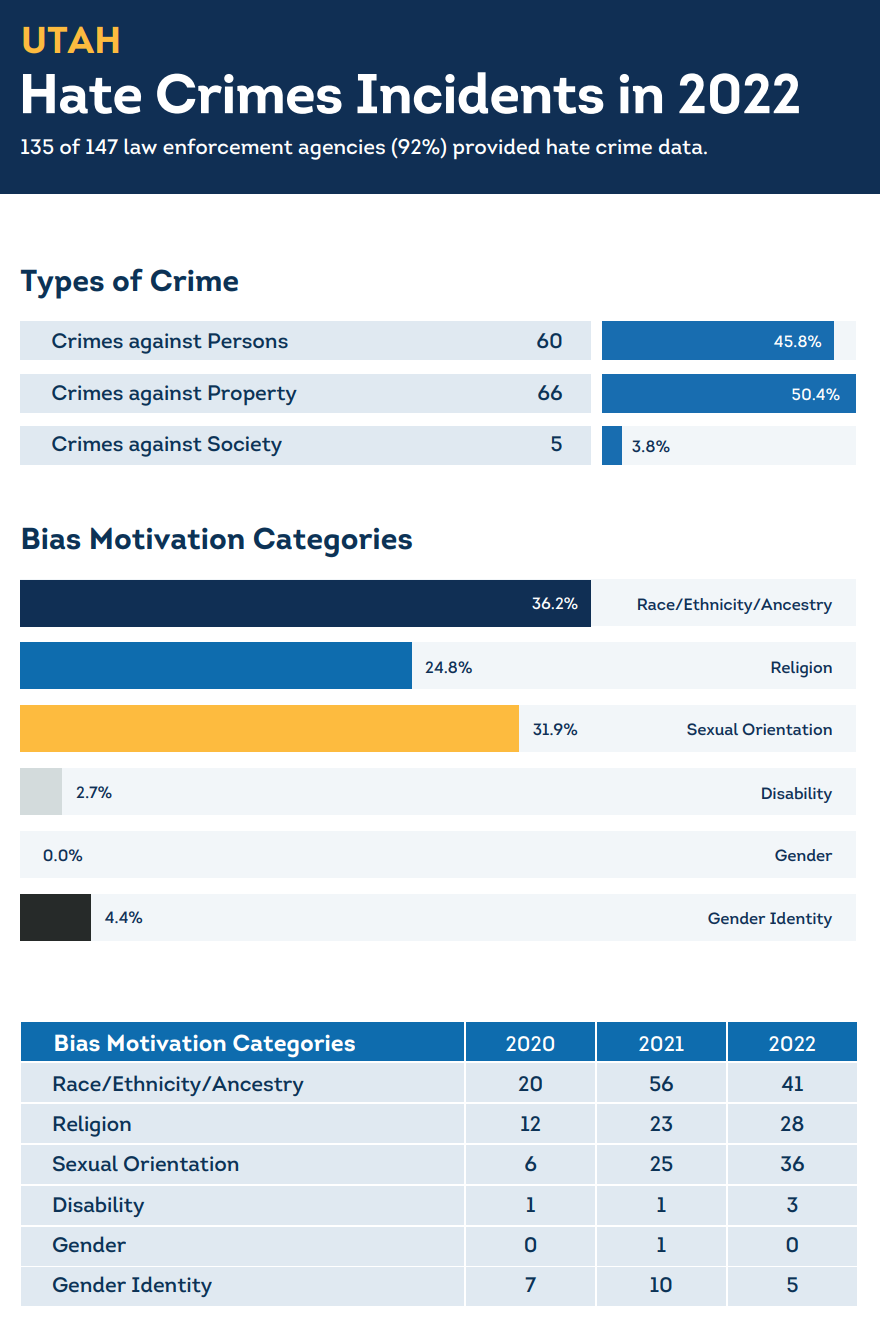LGBTQAI+ Statistics and Considerations: Hate Crime

LGBTQAI+ Related Statistics and Considerations: Hate Crime
[Go back to full LGBTQIA+ statistics and considerations list in educational resources tab]
 A hate crime is a criminal offense committed against a person or property that is motivated by the offender's bias or prejudice against the victim. As the Salt Lake City Police (n.d.) note, "some states outline classes protected under hate crime laws, such as a person's race, color, religion, gender identity, sexual orientation, disability, or national origin. However, state law in Utah is more broadly interpreted. A hate crime is a criminal offense committed against a person or property that is motivated by the offender's bias or prejudice against the victim. That bias may include a person’s sexual orientation, religion, gender, or skin color, as examples."
A hate crime is a criminal offense committed against a person or property that is motivated by the offender's bias or prejudice against the victim. As the Salt Lake City Police (n.d.) note, "some states outline classes protected under hate crime laws, such as a person's race, color, religion, gender identity, sexual orientation, disability, or national origin. However, state law in Utah is more broadly interpreted. A hate crime is a criminal offense committed against a person or property that is motivated by the offender's bias or prejudice against the victim. That bias may include a person’s sexual orientation, religion, gender, or skin color, as examples."
View the U.S. Department of Justice Utah Hate Crimes Incidents in 2022 Fact Sheet
Situation: Hate crimes incidents are high for LGBTQAI+ although likely vastly under-reported.
Evidence: According to the U.S. Department of Justice, in 2022 there were 36 Utah hate crime incidents related directly to sexual orientation and another 5 related directly to gender identity. Sadly, these numbers are rising against LGBTQAI+ people in Utah. According to Dunphey of Deseret News (2023), by September 25, 2023 there were more hate crimes reported against LGBTQ people in Utah for the year than the previous four years combined. The Utah Department of Public Safety reported 63 hate crimes against LGBTQ people on that date for 2023 with more of the year yet to go.
Considerations and Efforts to Address the Issues: Ongoing support for Utah’s hate crime laws covering all LGBTQ+ people. As the Salt Lake City Police Department states:
How can I, and why should I, report a hate crime? If you are the victim of a hate crime or witness a hate crime, it is important to report it to the appropriate authorities so the case can be investigated and support and resources offered.
- Call 9-1-1: If the crime is in-progress or there is an immediate threat to the safety of yourself or others.
- File a police report by calling 801-799-3000 and asking to speak with an officer about filing a hate crime report.
- Request assistance from an SLCPD Victim Advocate. You can call 801-799-3000 and ask to speak with a victim advocate or call 801-580-7969 24/7.
When reporting a hate crime, it is important to provide as much information as possible, including the date, time, and location of the incident, a description of the perpetrator, and any witnesses or evidence. Be sure to also provide a detailed account of what happened and how it made you feel. Remember that reporting a hate crime is important not only for your own safety and well-being, but also for the safety and well-being of your community.
References:
- Dunphey, K. (2023). Hate crimes against LGBTQ people surging in Utah, as bookshop gets bomb threat over drag event. Deseret News. https://www.deseret.com/utah/2023/9/25/23889540/hate-crimes-rising-in-utah-lgbtq-kings-english-bomb-threat/
- Salt Lake City Police (n.d.). Hate Crimes. https://slcpd.com/hatecrime/
[Go back to full LGBTQIA+ statistics and considerations list in educational resources tab]
